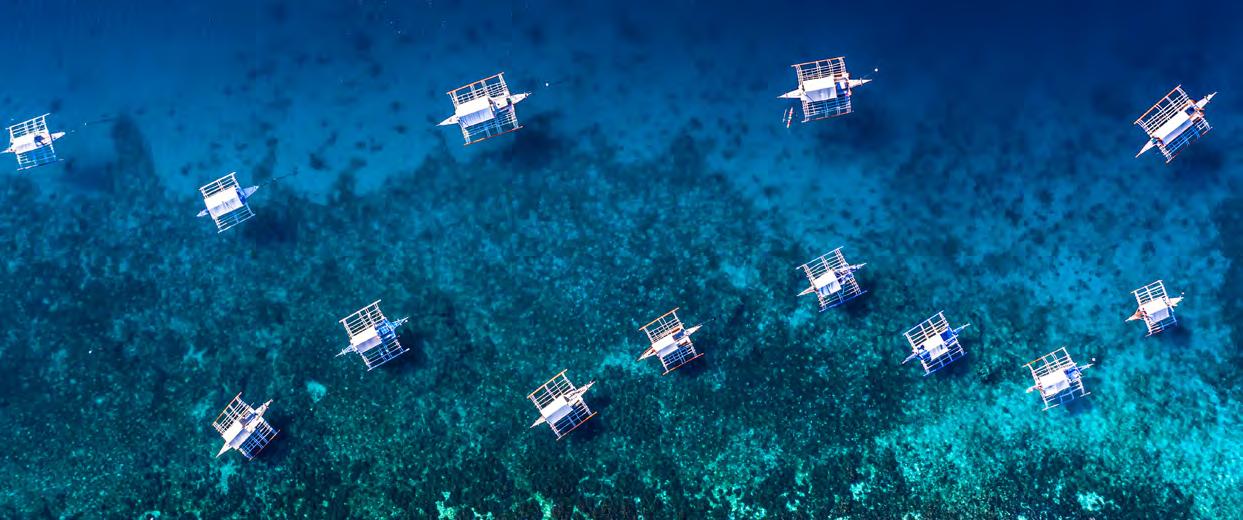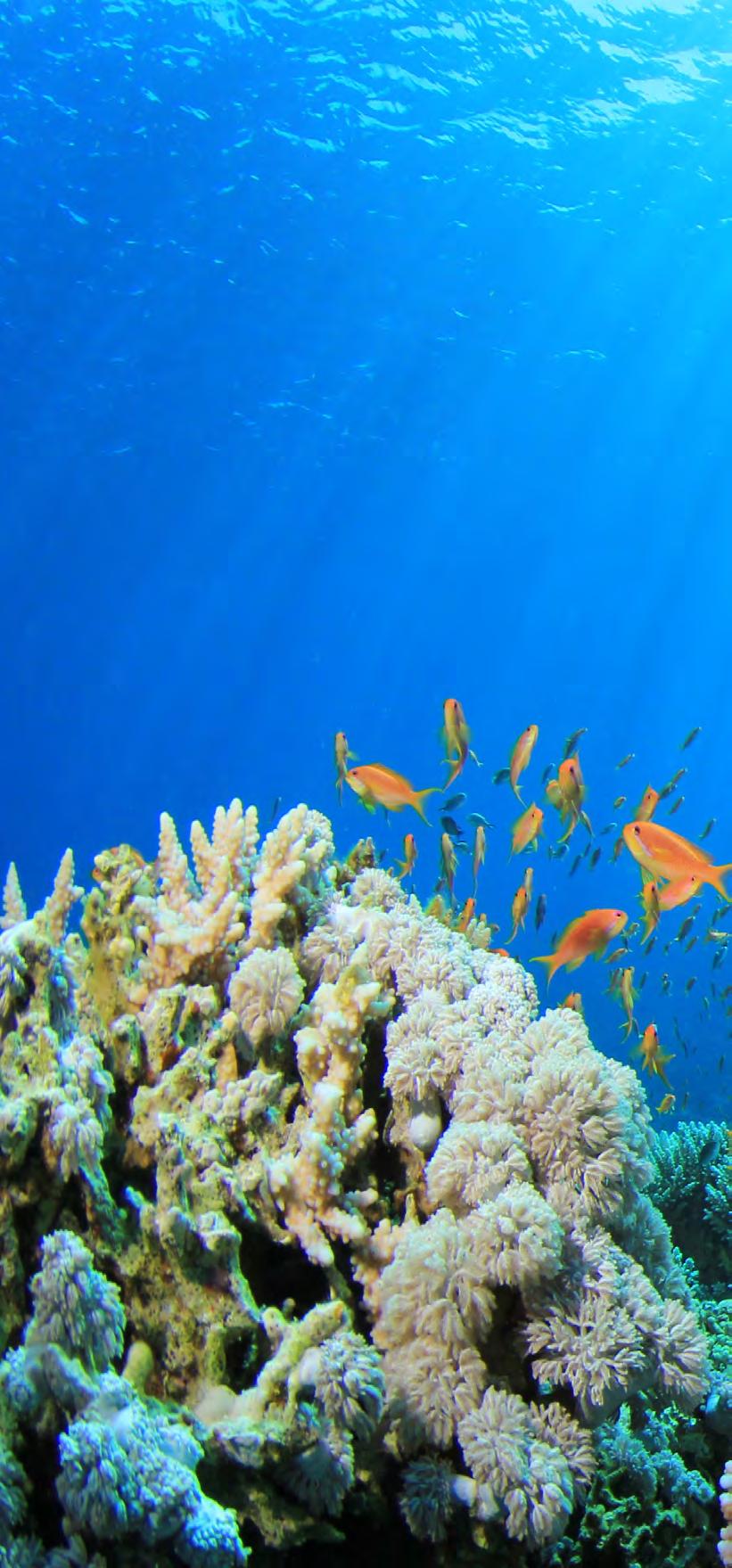
4 minute read
Development finance and effective co-operation
Development co-operation has a role to play to support developing countries turn both existing and emerging ocean-based sectors into catalysts for long-term, inclusive and sustainable development. For existing ocean-based sectors this largely means helping to seize opportunities to create new and better jobs, helping to correct the trends of financial leakages, economic exclusion and environmental degradation. For some new sectors, such as marine bio-technologies and extractive sectors, it largely means supporting countries to assess and balance risks and rewards and achieve sustainable use of resources that adequately integrate community interests and environmental concerns from the outset.
Several positive examples exist of development cooperation in support of more sustainable ocean economies. These include support for sustainable fisheries practices and enhanced seafood traceability; climateresilient port infrastructure; assessing the potential of marine renewable energies and helping with the upfront costs of investment; closing the gap in financing marine protection and co-management schemes that reinforce synergies across sectors and support local ownership of resource management. Despite these good examples, there
is a need for providers of development co-operation to understand the ocean economy more holistically and foster a broader mainstreaming of sustainability across ocean-based sectors.
Evidence on global finance for the ocean from its various sources – private, public, domestic and international – is still scarce and scattered. It is currently not possible to have a comprehensive view of how much finance reaches ocean-based sectors and what percentage of that can be considered sustainable. To fill this gap, the OECD has started to quantify and track global development finance for the ocean, detailing its scope, sources and destinations, and providing estimates of what share is sustainable. Development finance estimates are also produced for funding towards land-based activities that reduce negative impacts on ocean (e.g. waste management and water treatment).
Better tracking is the first step towards better use and impact of development finance for sustainable ocean economies. Quantifying and monitoring development finance for the ocean is critical to obtain a clear picture of current trends and progress towards greater ocean sustainability. It increases the transparency and visibility of relevant development finance flows and activities. It is a prerequisite for understanding what works and what does not, contributing to foster greater effectiveness and impact of these flows. For Official Development Assistance (ODA), OECD has developed three main indicators to track ocean-relevant finance (Figure 14).
Figure 14. OECD’s key indicators for tracking ocean-relevant Official Development Assistance (ODA)
Ocean-relevant ODA
ODA for the
OCEAN ECONOMY
» Ocean-based industries & marine ecosystems, irrespective of sustainability
ODA for the
SUSTAINABLE OCEAN ECONOMY
ODA for
Ocean-related Land-based Activities
Actions to reduce the negative impacts of land-based activities on the ocean (e.g. waste management, water treatment, etc.)
Development finance can catalyse private finance towards sustainability
ODA can help tilt finance towards sustainability and indeed is increasingly being used catalytically to leverage private finance towards the conservation and sustainable use of the ocean. Development partners are using development finance and technical assistance to do this in two main ways: (i) through blended finance arrangements that use standard grants, guarantees, and other instruments; and (ii) through the development of a range of new financial products, such as blue bonds, debt-fornature swaps, and insurance schemes. For instance, grants and guarantees from development partners were critical to structure the first Blue Bond (Seychelles), which allowed the country to harness capital market resources for marine conservation and sustainable ocean-based activities.
New OECD work in this area quantifies private finance mobilised through ODA, detailing the range of leveraging instruments used. It also maps new financial instruments developed through development co-operation and examines key challenges and opportunities for scaling them up in developing countries.
New development co-operation schemes can support ocean-related economic activity
Development co-operation needs to test and implement new ideas and approaches to be able to sustainably and effectively support developing countries face the new opportunities and challenges from the expanding economic activity in the ocean. Some emerging sectors could generate revenue for developing countries in the short term, but financial gains may be highly concentrated and difficult to reconcile with inclusive development. Destructive environmental impacts can be long-lasting and extend well beyond national borders with global consequences on basic ocean ecosystem functions. New international development schemes could provide support to individual developing countries for valorising or enhancing ocean ecosystem services, for instance through the creation of no-take zones to improve the replenishment rates of in-shore fish stocks and blue carbon projects to recognise and protect the carbon sequestration potential of certain ocean ecosystems like kelp forests, sea-grass beds and mangroves. New development co-operation schemes could also aim to strengthen developing countries’ expertise and negotiating skills for new markets. Support for achieving fair commercial deals and concessions would be particularly relevant in a time when ocean resources are becoming more valuable and increasingly up for commercial exploitation.
KEY PUBLICATIONS
OECD (2020), Sustainable Ocean for All: Harnessing Benefits for Developing Countries, forthcoming.
OECD (2018), Making Development Co-operation Work for Small Island Developing States, OECD Publishing, Paris, http://dx.doi.org/10.1787/9789264287648-en.
OECD/The World Bank (2016), Climate and Disaster Resilience Financing in Small Island Developing States, OECD Publishing, Paris, https://doi.org/10.1787/9789264266919-en.
KEY WEBSITE
www.oecd.org/dac/financing-sustainable-development/ development-finance-topics/small-island-developing-states.htm
CONTACT
Piera Tortora – Piera.Tortora@oecd.org
For more information:


www.oecd.org/ocean
ocean@oecd.org
@OECD_ENV @OECDdev @OECDagriculture @OECDinnovation
© OECD, June 2020






